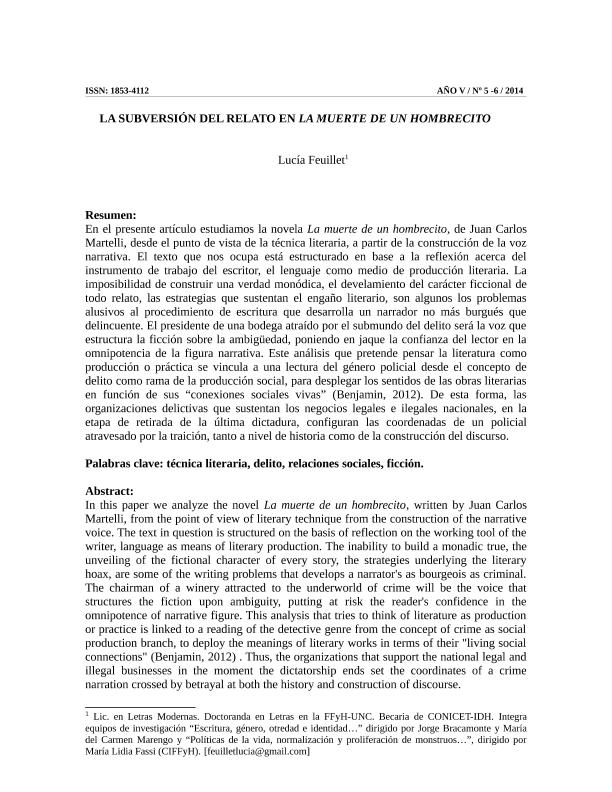Mostrar el registro sencillo del ítem
dc.contributor.author
Feuillet, Lucía

dc.date.available
2018-01-10T20:01:08Z
dc.date.issued
2014-12
dc.identifier.citation
La subversión del relato en La muerte de un hombrecito; Universidad Nacional de Córdoba. Facultad de Filosofía y Humanidades. Centro de Investigaciones; Recial; 5; 5-6; 12-2014; 1-17
dc.identifier.issn
1853-4112
dc.identifier.uri
http://hdl.handle.net/11336/32899
dc.description.abstract
En el presente artículo estudiamos la novela La muerte de un hombrecito, de JuanCarlos Martelli, desde el punto de vista de la técnica literaria, a partir de la construcción de la voz narrativa. El texto que nos ocupa está estructurado en base a la reflexión acerca del instrumento de trabajo del escritor, el lenguaje como medio de producción literaria. La imposibilidad de construir una verdad monódica, el develamiento del carácter ficcional de todo relato, las estrategias que sustentan el engaño literario, son algunos los problemas alusivos al procedimiento de escritura que desarrolla un narrador no más burgués que delincuente. El presidente de una bodega atraído por el submundo del delito será la voz que estructura la ficción sobre la ambigüedad, poniendo en jaque la confianza del lector en la omnipotencia de la figura narrativa. Este análisis que pretende pensar la literatura como producción o práctica se vincula a una lectura del género policial desde el concepto de delito como rama de la producción social, para desplegar los sentidos de las obras literariasen función de sus ?conexiones sociales vivas? (Benjamin, 2012). De esta forma, las organizaciones delictivas que sustentan los negocios legales e ilegales nacionales, en la etapa de retirada de la última dictadura, configuran las coordenadas de un policial atravesado por la traición, tanto a nivel de historia como de la construcción del discurso.
dc.description.abstract
In this paper we analyze the novel La muerte de un hombrecito, written by Juan Carlos Martelli, from the point of view of literary technique from the construction of the narrative voice. The text in question is structured on the basis of reflection on the working tool of the writer, language as means of literary production. The inability to build a monadic true, the unveiling of the fictional character of every story, the strategies underlying the literary hoax, are some of the writing problems that develops a narrator's as bourgeois as criminal. The chairman of a winery attracted to the underworld of crime will be the voice that structures the fiction upon ambiguity, putting at risk the reader's confidence in the omnipotence of narrative figure. This analysis that tries to think of literature as production or practice is linked to a reading of the detective genre from the concept of crime as social production branch, to deploy the meanings of literary works in terms of their "living social connections" (Benjamin, 2012) . Thus, the organizations that support the national legal and illegal businesses in the moment the dictatorship ends set the coordinates of a crime narration crossed by betrayal at both the history and construction of discourse.
dc.format
application/pdf
dc.language.iso
spa
dc.publisher
Universidad Nacional de Córdoba. Facultad de Filosofía y Humanidades. Centro de Investigaciones
dc.rights
info:eu-repo/semantics/openAccess
dc.rights.uri
https://creativecommons.org/licenses/by-nc-sa/2.5/ar/
dc.subject
Técnica Literaria
dc.subject
Delito
dc.subject
Relaciones Sociales
dc.subject
Ficción
dc.subject.classification
Estudios Generales del Lenguaje

dc.subject.classification
Lengua y Literatura

dc.subject.classification
HUMANIDADES

dc.title
La subversión del relato en La muerte de un hombrecito
dc.type
info:eu-repo/semantics/article
dc.type
info:ar-repo/semantics/artículo
dc.type
info:eu-repo/semantics/publishedVersion
dc.date.updated
2018-01-03T20:57:19Z
dc.journal.volume
5
dc.journal.number
5-6
dc.journal.pagination
1-17
dc.journal.pais
Argentina

dc.journal.ciudad
Córdoba
dc.description.fil
Fil: Feuillet, Lucía. Consejo Nacional de Investigaciones Científicas y Técnicas. Centro Científico Tecnológico Conicet - Córdoba. Instituto de Humanidades. Universidad Nacional de Córdoba. Instituto de Humanidades; Argentina
dc.journal.title
Recial
dc.relation.alternativeid
info:eu-repo/semantics/altIdentifier/url/https://revistas.unc.edu.ar/index.php/recial/article/view/9589
Archivos asociados
